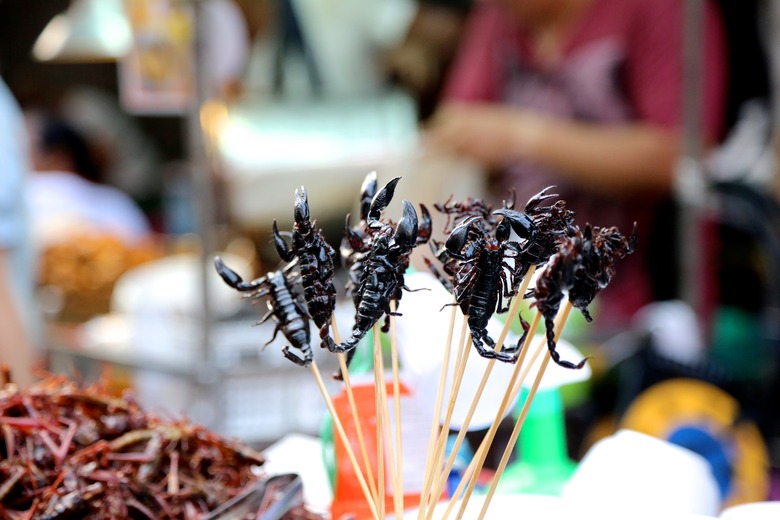Anti-Cancer Creepy Crawlies? Yup – Eating Bugs Is Great For You
What if a glass of diluted, powdered cricket offered the same antioxidant benefits as orange juice – but with a bunch more protein, minerals and fiber? And what if some drinkable silkworm fat doubled the antioxidant power of a glass of orange juice? That'd probably just be gross, right?
Well, we've got some gross news for you.
A team of Italian scientists published a study in Frontiers in Nutrition in late July, measuring antioxidant levels in commercially available edible insects for the first time. The study yielded some interesting results.
Bugs for Human, Planet Health
Bugs for Human, Planet Health
About one-fourth of Earth's population (equaling roughly 2 billion people) eats insects on a daily basis, according to Weird Science News. And it makes sense: Bugs pack a punch of fiber, protein and vitamins – plus antioxidants, according to this recent research. Even so, Western cultures struggle to digest the idea of eating bugs, though most of us sacrifice taste in the name of health every once in a while.
But there's more than personal health to take into account here. Insects boast a tiny carbon footprint when compared to livestock, making a buggy diet healthier for Earth, as well.
University of Teramo Professor Mauro Serafini, who co-authored the Frontiers study, said in a press release that the West may need selfish, immediate incentives in order to buy into the idea of eating insects as a sustainable meat and animal product alternative.
"Edible insects are an excellent source of protein, polyunsaturated fatty acids, minerals, vitamins and fiber," Serafini said in the release. "But until now, nobody had compared them with classical functional foods such as olive oil or orange juice in terms of antioxidant activity."
How the Study Worked
How the Study Worked
For their research, these Italian scientists tested an array of edible, commercially available insects and invertebrates to measure their levels of antioxidants. They removed any inedible parts of the bugs, like wings and stings, then ground the critters and extracted their fat and soluble parts. They then tested both the fat and the soluble insect powder for antioxidant content and activity.
"For perspective, using the same setup we tested the antioxidant capacity of fresh orange juice and olive oil – functional foods that are known to exert antioxidant effects in humans," Serafini said in the Frontier press release.
The water-soluble extracts for crickets, grasshoppers and silkworms yielded the largest capacities for antioxidants. Giant cicada, giant water bugs, black scorpions and black tarantula had next to no antioxidant power. Serafini pointed out the pattern: The vegetarian bugs boasted more antioxidants.
If you diluted this insect powder in water, it would yield about 75% the antioxidant power of orange juice, plus the other health benefits of consuming insects.
As for the fat extracts, giant cicadas and silkworms yielded twice the antioxidant power of olive oil.
"A high content of antioxidant in the food matrix is a primary requisite for a first screening of antioxidant potentiality of novel foods, so these are promising results," Serafini said in the release. "In the future, we might also adept dietary regimens for insect rearing in order to increase their antioxidant content for animal or human consumption."
References
- Weird Science News: Scientists Claim That Insects Are Full of Antioxidants, and That Drinking "Cricket Juice" Halts Cancer
- Frontiers Science News: Meet the Six-Legged Superfoods – Grasshoppers Top Insect Antioxidant-Rich List
- Frontiers Nutrition: Antioxidant Activities in vitro of Water and Liposoluble Extracts Obtained by Different Species of Edible Insects and Invertebrates
Cite This Article
MLA
Swanston, Brenna. "Anti-Cancer Creepy Crawlies? Yup – Eating Bugs Is Great For You" sciencing.com, https://www.sciencing.com/anti-cancer-creepy-crawlies-yup-eating-bugs-is-great-for-you-13720351/. 29 July 2019.
APA
Swanston, Brenna. (2019, July 29). Anti-Cancer Creepy Crawlies? Yup – Eating Bugs Is Great For You. sciencing.com. Retrieved from https://www.sciencing.com/anti-cancer-creepy-crawlies-yup-eating-bugs-is-great-for-you-13720351/
Chicago
Swanston, Brenna. Anti-Cancer Creepy Crawlies? Yup – Eating Bugs Is Great For You last modified March 24, 2022. https://www.sciencing.com/anti-cancer-creepy-crawlies-yup-eating-bugs-is-great-for-you-13720351/
